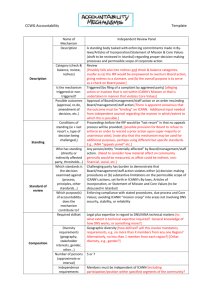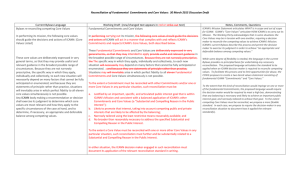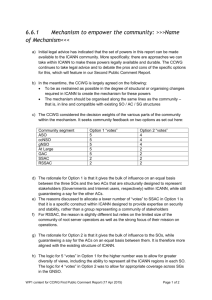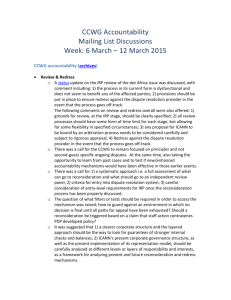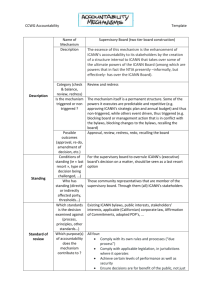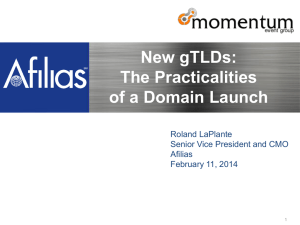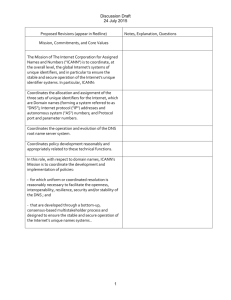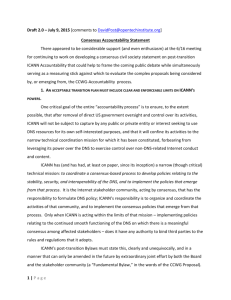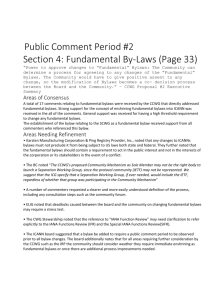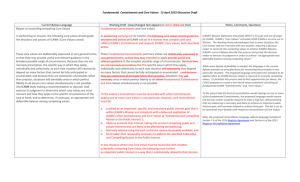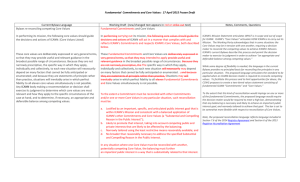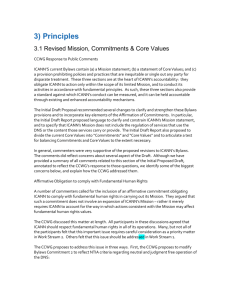Revised Comment Summary PRINCIPLES (DMc)
advertisement
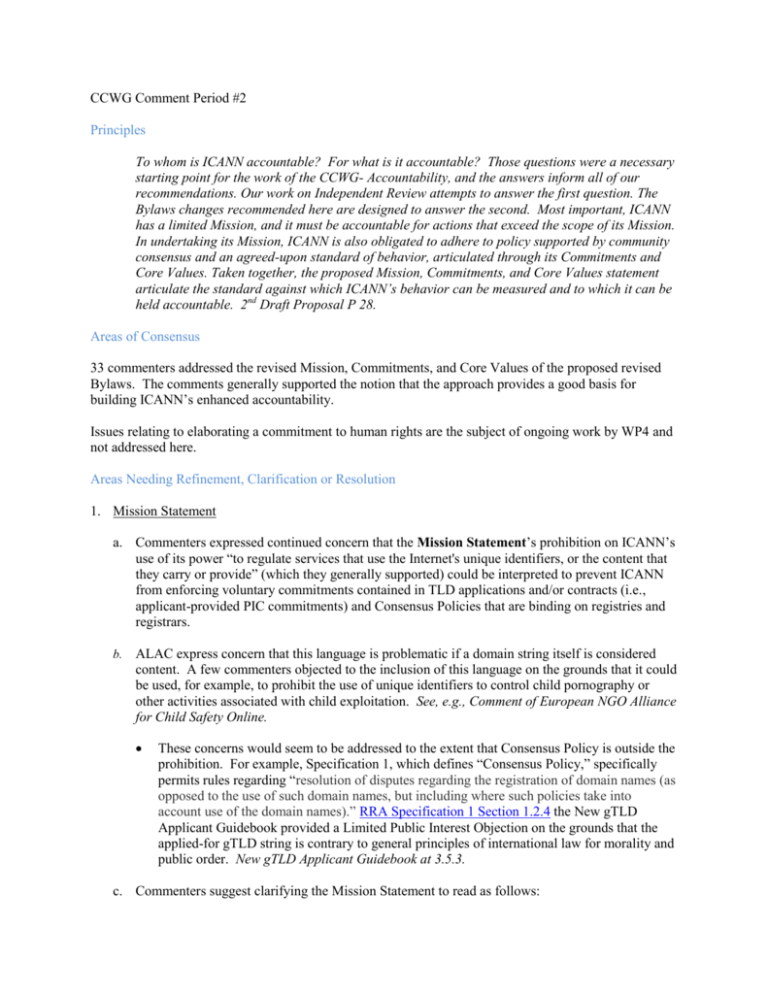
CCWG Comment Period #2 Principles To whom is ICANN accountable? For what is it accountable? Those questions were a necessary starting point for the work of the CCWG- Accountability, and the answers inform all of our recommendations. Our work on Independent Review attempts to answer the first question. The Bylaws changes recommended here are designed to answer the second. Most important, ICANN has a limited Mission, and it must be accountable for actions that exceed the scope of its Mission. In undertaking its Mission, ICANN is also obligated to adhere to policy supported by community consensus and an agreed-upon standard of behavior, articulated through its Commitments and Core Values. Taken together, the proposed Mission, Commitments, and Core Values statement articulate the standard against which ICANN’s behavior can be measured and to which it can be held accountable. 2nd Draft Proposal P 28. Areas of Consensus 33 commenters addressed the revised Mission, Commitments, and Core Values of the proposed revised Bylaws. The comments generally supported the notion that the approach provides a good basis for building ICANN’s enhanced accountability. Issues relating to elaborating a commitment to human rights are the subject of ongoing work by WP4 and not addressed here. Areas Needing Refinement, Clarification or Resolution 1. Mission Statement a. Commenters expressed continued concern that the Mission Statement’s prohibition on ICANN’s use of its power “to regulate services that use the Internet's unique identifiers, or the content that they carry or provide” (which they generally supported) could be interpreted to prevent ICANN from enforcing voluntary commitments contained in TLD applications and/or contracts (i.e., applicant-provided PIC commitments) and Consensus Policies that are binding on registries and registrars. b. ALAC express concern that this language is problematic if a domain string itself is considered content. A few commenters objected to the inclusion of this language on the grounds that it could be used, for example, to prohibit the use of unique identifiers to control child pornography or other activities associated with child exploitation. See, e.g., Comment of European NGO Alliance for Child Safety Online. These concerns would seem to be addressed to the extent that Consensus Policy is outside the prohibition. For example, Specification 1, which defines “Consensus Policy,” specifically permits rules regarding “resolution of disputes regarding the registration of domain names (as opposed to the use of such domain names, but including where such policies take into account use of the domain names).” RRA Specification 1 Section 1.2.4 the New gTLD Applicant Guidebook provided a Limited Public Interest Objection on the grounds that the applied-for gTLD string is contrary to general principles of international law for morality and public order. New gTLD Applicant Guidebook at 3.5.3. c. Commenters suggest clarifying the Mission Statement to read as follows: ICANN shall not engage in or use its powers to attempt the regulation regulate services that use the Internet’s unique identifiers or the content that they such services carry or provide. These amendments appear to be acceptable. 2. Commitments and Core Values a. Commitment 2 requires ICANN to “Preserve and enhance the neutral and judgment free operation of the DNS, and the operational stability, reliability, security, global interoperability, resilience, and openness of the DNS and the Internet.” b. ALAC has objected to the reference to the “neutral and judgment free operation of the DNS,” (which is an NTIA requirement) as too open-ended. Commitment 5 obligates ICANN to: Employ open\ transparent and bottom-up, multistakeholder policy development processes, led by the private sector, including business stakeholders, civil society, the technical community, academia, and that (i) seek input from the public, for whose benefit ICANN shall in all events act, (ii) promote well-informed decisions based on expert advice, and (iii) ensure that those entities most affected can assist in the policy development process. Core Value 7 also requires ICANN to remain “rooted in the private sector, including business stakeholders, civil society, the technical community, and academia.” c. The governments of Brazil, and Argentina objected to the reference to private sector leadership in Core Value 7 and Commitment 5 on the grounds that it is inconsistent with the multi-stakeholder model. The government of Spain does not object to the reference to private sector leadership in Commitment 5 but suggests modifying the text of Commitment 5 by adding the following phrase: “while duly taking into account the public policy advice of governments and public authorities, whenever public interest is affected.” Other commenters strongly defend the language, pointing out that the ICANN Bylaws assign primary policy development responsibility to the GNSO/ALAC and the ccNSO, with the GAC playing an advisory role. ALAC and others urge that the list of private sector stakeholders be expanded to include end users. The government of Spain has indicated that it would support this change In the 1rst Draft Report, Core Value 2 was amended as follows: To the extent feasible and appropriate Delegating coordination functions to or recognizing the policy role of other responsible entities that reflect the interests of affected parties and the roles of both ICANN’s internal bodies and external expert bodies; Also in the 1rst Draft Report, Core Value 4 was amended to read as follows: Where feasible and appropriate, depending on market mechanisms to promote and sustain a healthy competitive environment in the DNS market. d. ALAC has objected to the deletion of the highlighted language. One commenter objected to the language in Core Value 4 on the grounds that ICANN was created, in part, to “regulate the conditions of competition in the DNS markets.” The CCWG notes, however, that this language is contained in the current Bylaws and does not reflect a change in ICANN’s role. The UK government and others urged the CCWG to amend Core Value 4 (which is Core Value 5 in the current Bylaws) to add the phrase “to enhance consumer trust and choice.” The revised text would read: “depending on market mechanisms to promote and sustain a healthy competitive environment in the DNS market that enhances consumer trust and choice.” Similarly, the IPC, the MPA objected to the decision to move AoC language regarding expansion of the TLD space from the Core Values to the Section on AoC reviews. The CCWG notes that these concepts have been included in proposed Bylaws text for the Affirmation of Commitments Review, consistent with their placement in the AoC itself. 2nd Draft Report P. 566. Several comments took exception to the elimination of language in the 1rst Draft that limited ICANN’s obligation to take public policy advice into account to the extent such advice is “consistent with” the Mission, Commitments and Core Values. (Several governments, on the other hand, welcomed this change.) As explained in the 2nd Draft Proposal, removing this language does not empower ICANN to violate its Bylaws in response to GAC Advice. To reinforce this point, the CCWG would clarify the Bylaws to ensure that the IRP is available to address “any decision or action by the Board or staff that is inconsistent with the Articles of Incorporation or Bylaws, including “any such decision or action taken in response to the recommendation of an advisory committee or supporting organization.” In other words, without constraining the GAC’s ability to provide advice, the changes clarify that ICANN must implement any such advice in a manner that is consistent with ICANN’s Mission, Commitments, and Core Values. In addition, Commitment 1 expressly obligates ICANN to operate in a manner consistent with its Bylaws. Several commenters nonetheless suggested that this approach was inadequate. The CCWG also proposes, consistent with the ATRT2 recommendation, to add a general provision to Article XI of the Bylaws to provide that each advisory committee should “provide a rational for its advice, with references to relevant applicable national or international law where appropriate.” The Government of France indicated that it would object to this provision if the provision of such rationale would replace the obligation to consult with the GAC. The provision of a rationale for advice does not in any manner alter ICANN’s current obligation to consult with the GAC under the Bylaws. 3. Balancing Test a. The ALAC suggested that the balancing statement should be clear that any such balancing should be secondary to security and stability requirements. This clarification appears to be unnecessary because, as the text states, “Commitments,” which reflect ICANN’s fundamental compact with the global Internet community,” are excluded from any balancing test as they “are intended to apply consistently and comprehensively to ICANN’s activities. “
